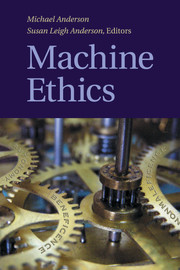Book contents
- Frontmatter
- Contents
- General Introduction
- PART I THE NATURE OF MACHINE ETHICS
- PART II THE IMPORTANCE OF MACHINE ETHICS
- PART III ISSUES CONCERNING MACHINE ETHICS
- Introduction
- 6 What Matters to a Machine?
- 7 Machine Ethics and the Idea of a More-Than-Human Moral World
- 8 On Computable Morality
- 9 When Is a Robot a Moral Agent?
- 10 Philosophical Concerns with Machine Ethics
- 11 Computer Systems
- 12 On the Morality of Artificial Agents
- 13 Legal Rights for Machines
- PART IV APPROACHES TO MACHINE ETHICS
- PART V VISIONS FOR MACHINE ETHICS
- References
6 - What Matters to a Machine?
from PART III - ISSUES CONCERNING MACHINE ETHICS
Published online by Cambridge University Press: 01 June 2011
- Frontmatter
- Contents
- General Introduction
- PART I THE NATURE OF MACHINE ETHICS
- PART II THE IMPORTANCE OF MACHINE ETHICS
- PART III ISSUES CONCERNING MACHINE ETHICS
- Introduction
- 6 What Matters to a Machine?
- 7 Machine Ethics and the Idea of a More-Than-Human Moral World
- 8 On Computable Morality
- 9 When Is a Robot a Moral Agent?
- 10 Philosophical Concerns with Machine Ethics
- 11 Computer Systems
- 12 On the Morality of Artificial Agents
- 13 Legal Rights for Machines
- PART IV APPROACHES TO MACHINE ETHICS
- PART V VISIONS FOR MACHINE ETHICS
- References
Summary
Why Is Machine Ethics Interesting?
There has recently been a flurry of activity in the area of “machine ethics” [38, 4, 3, 5, 58]. My purpose in this article is to argue that ethical behavior is an extremely difficult area to automate, both because it requires “solving all of AI” and because even that might not be sufficient.
Why is machine ethics interesting? Why do people think we ought to study it now? If we're not careful, the reason might come down to the intrinsic fascination of the phrase “machine ethics.” The title of one recent review of the field is Moral Machines. One's first reaction is that moral machines are to be contrasted with … what? Amoral machines? Immoral machines? What would make a machine ethical or unethical? Any cognitive scientist would love to know the answer to these questions.
However, it turns out that the field of machine ethics has little to say about them. So far, papers in this area can usefully be classified as focusing on one, maybe two, of the following topics:
Altruism: The use of game-theoretic simulations to explore the rationality or evolution of altruism [9, 12].
Constraint: How computers can be used unethically, and how to program them so that it is provable that they do not do something unethical [28, 29], such as violate someone's privacy.
Reasoning: The implementation of theories of ethical reasoning [38, 4] for its own sake, or to help build artificial ethical advisors.
[…]
- Type
- Chapter
- Information
- Machine Ethics , pp. 88 - 114Publisher: Cambridge University PressPrint publication year: 2011
References
- 8
- Cited by



